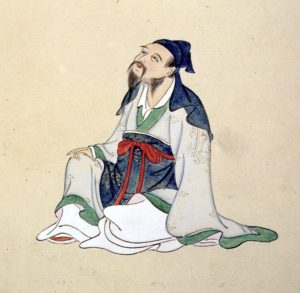Saints & Sages Part IV:
李白
The Sage Poet Li Bai
______________________________________________

Even though the genius poet Li Bai technically speaking is not a sage or saint, he is deserving of the title as “sage” poet. Li Bai formally became a Taoist, after ending his career at court. This fascination with Daoism, internal alchemy, immortals and recluses is clearly reflected in his poetry. He is featured as protagonists in the following story, giving insights into his character and upbringing, and, arguably, the catalyst for his ingenuity.
______________________________________________
铁杵磨成针
Grinding an Iron Rod into a Needle
______________________________________________
This idiom above originates from 《Exhausting Overview of all Parts of the Empire》 [fang yu sheng lan方輿勝覽] , an imperial geography written by the Southern Song period (1127-1279) scholar Zhu Mu [祝穆]. It is loosely translated as “Perseverance will prevail” in English. The problem with finding an equivalent of Chinese saying in a foreign language is that many strata of meaning are lost. Below is recounted the story behind the expression, translated from the Chinese. The story is simple, yet Catholic priest Anthony De Mello, an Indian Jesuit priest, psychotherapist and spiritual teacher, stated that “a story is the fastest way into the Heart”:
李白是唐朝有名的诗人。据说他年轻的时候,读书进步得很慢,他心里就不耐烦起来。有一天,他出门去玩儿,看见一个老婆婆蹲在小溪旁边,拿着一根铁棒在石头上磨。李白觉得很奇怪,就问:“老婆婆,你这是干什么?”老婆婆头也不回,一边磨她的铁棒,一边回答说:“我在磨绣花针!”李白更奇怪了,又问:“这么粗的铁棒,能磨成绣花针吗?”老婆婆说:“我今天磨,明天磨,铁棒只会越磨越细,哪怕它磨不成绣花针!”李白听了老婆婆的话,心里像开了窍。他从此刻苦用功,果然成了一个很有文才的人。
“磨杵成针”就是从这个故事来的。这个成语说明只要下苦功夫,一定能得到成功。所以常有人说:“只要功夫深,铁杵磨成针。”
Li Bai was a famous poet from the Tang dynasty. Legend has it that when he was young, his progress in his studies was very slow, [and] impatience then was rising in his Heart-Mind. One day, he exited the gates to go play, [when he] saw an old grandma squatting next to a small brook, whilst holding an iron rod [and] grinding [it] on a stone. Li Bai felt [that it was] very strange, therefore, asking:
Old grannie, what are you doing with this?
The old grandma did not turn her head, [while] the one hand grinding her iron rod, on the other hand [she] answered [by] saying:
I am grinding an embroidery needle!
Li Bai felt [that this was] even stranger, [so he] also asked:
Can such a thick iron rod be ground down into an embroidery needle?
The old grandma said:
I grind today, I grind tomorrow grind. The iron rod can only become thinner the more [it] is ground. Where could there be fear [that] it could not be ground into an embroidery needle!
Li Bai listened to the old grandma’s words, [when] within [his] Heart-Mind seemingly it seemed an orifice [was] opened. From this [moment] onward he assiduously and diligently employed [his] Gong, sure enough becoming a very literate and talented person. Grinding a Rod Into a Needle’ originates exactly from this story. This idiom explains clearly that as long as one  concentrates [one’s] efforts in bitterness and hardships, certainly [one] will be able to obtain success. Therefore, common people utter:
concentrates [one’s] efforts in bitterness and hardships, certainly [one] will be able to obtain success. Therefore, common people utter:
As long as your Gong is deep, the iron rod grinds down into a needle.
______________________________________________
Post-Scriptum: This article will appear in the appendix of Purple Cloud Press’ forthcoming publication of 《The 49 Barriers of Daoist Cultivation》 by Xing De, a manual for refining Inner Nature based on Liu Yiming’s 50 Barriers.
